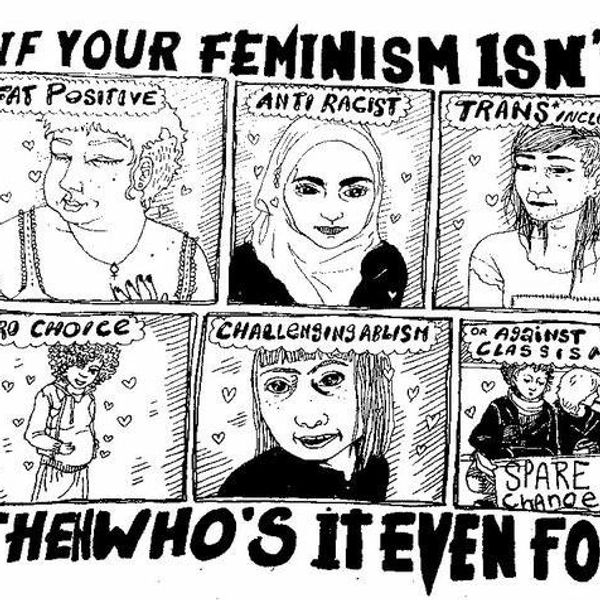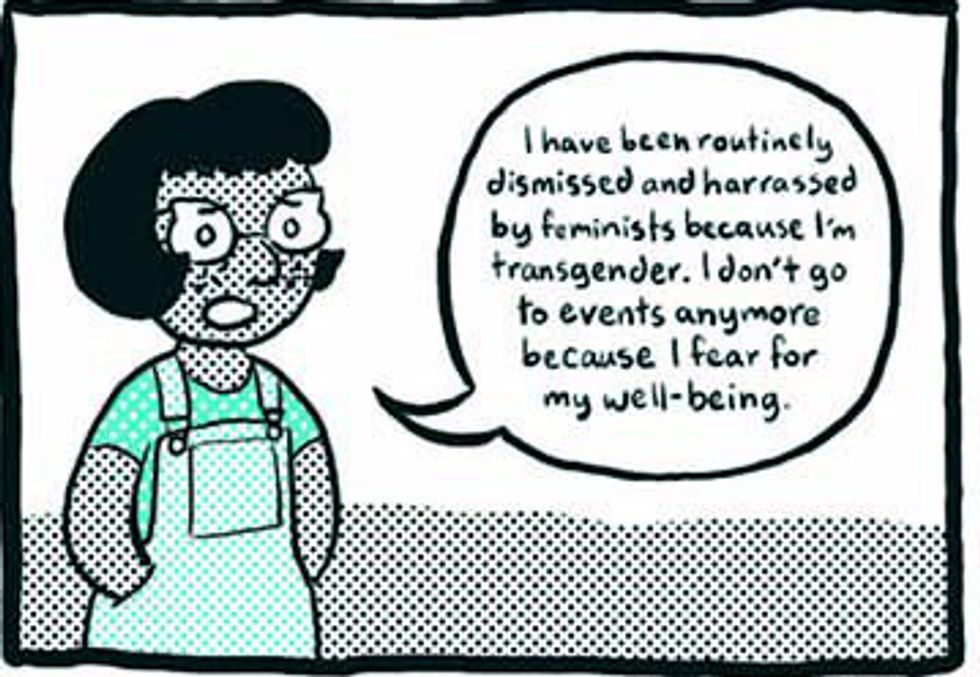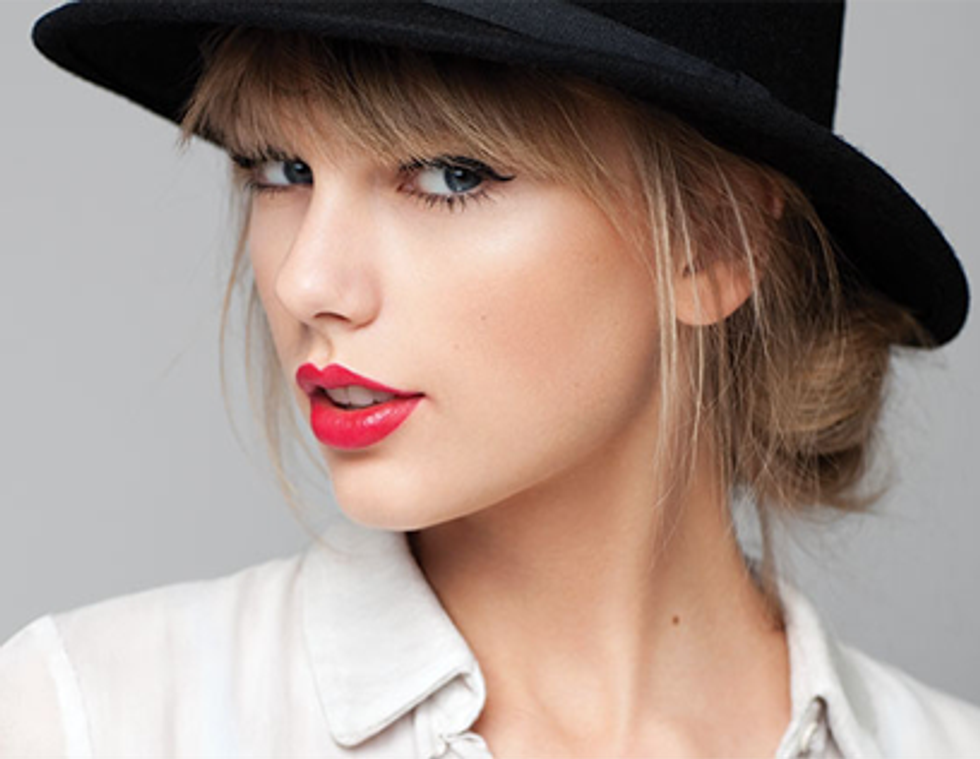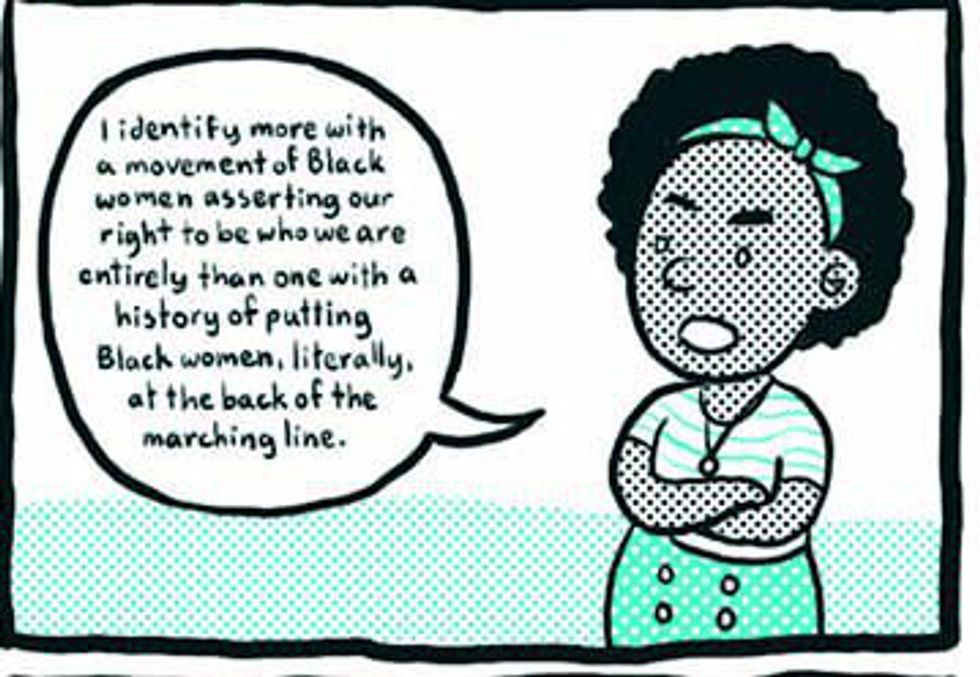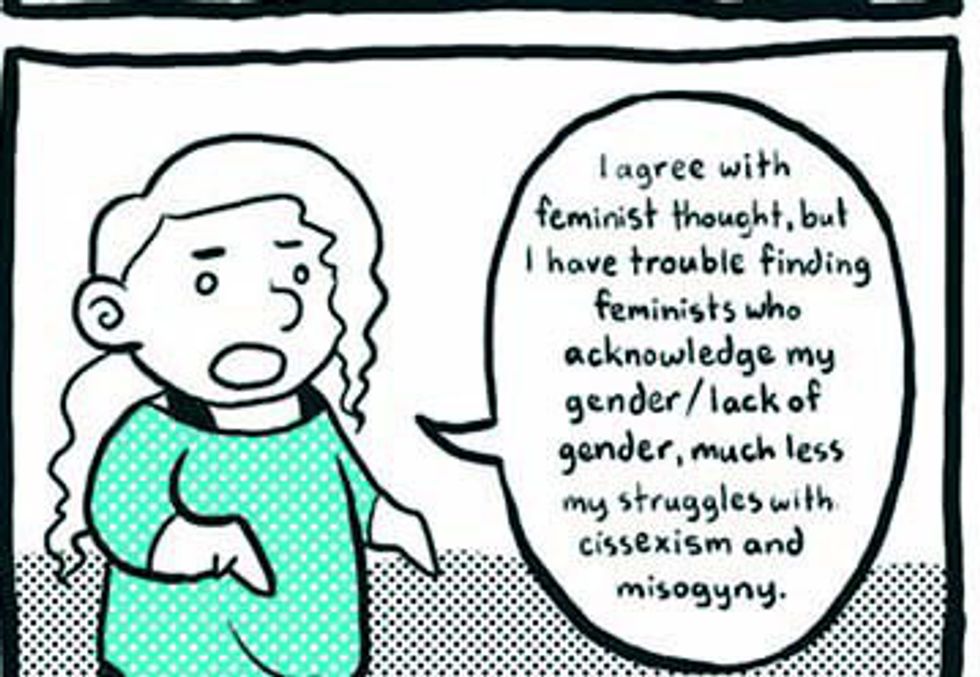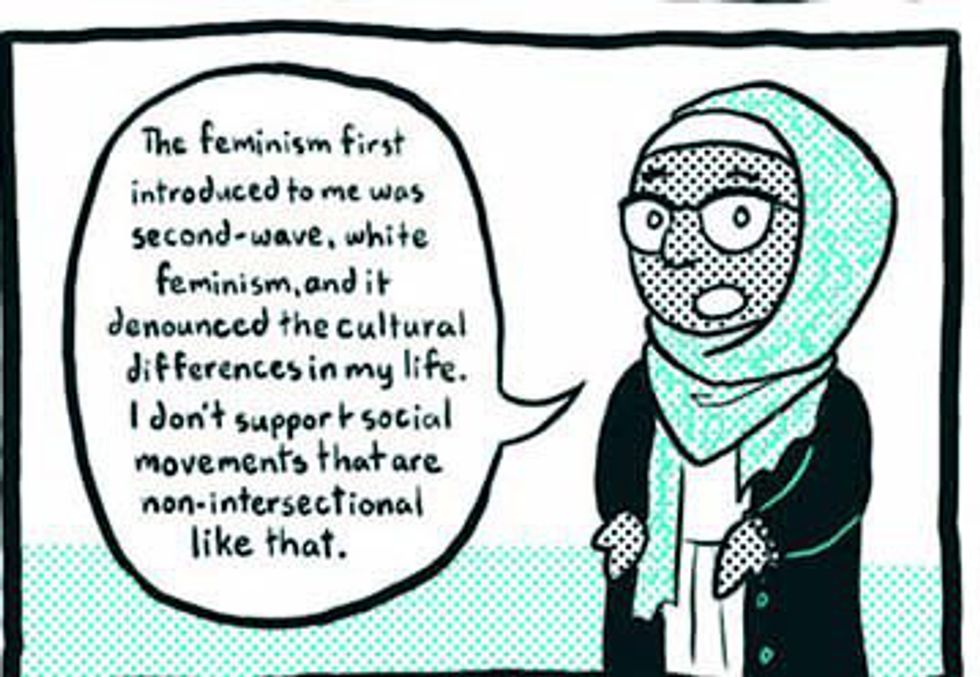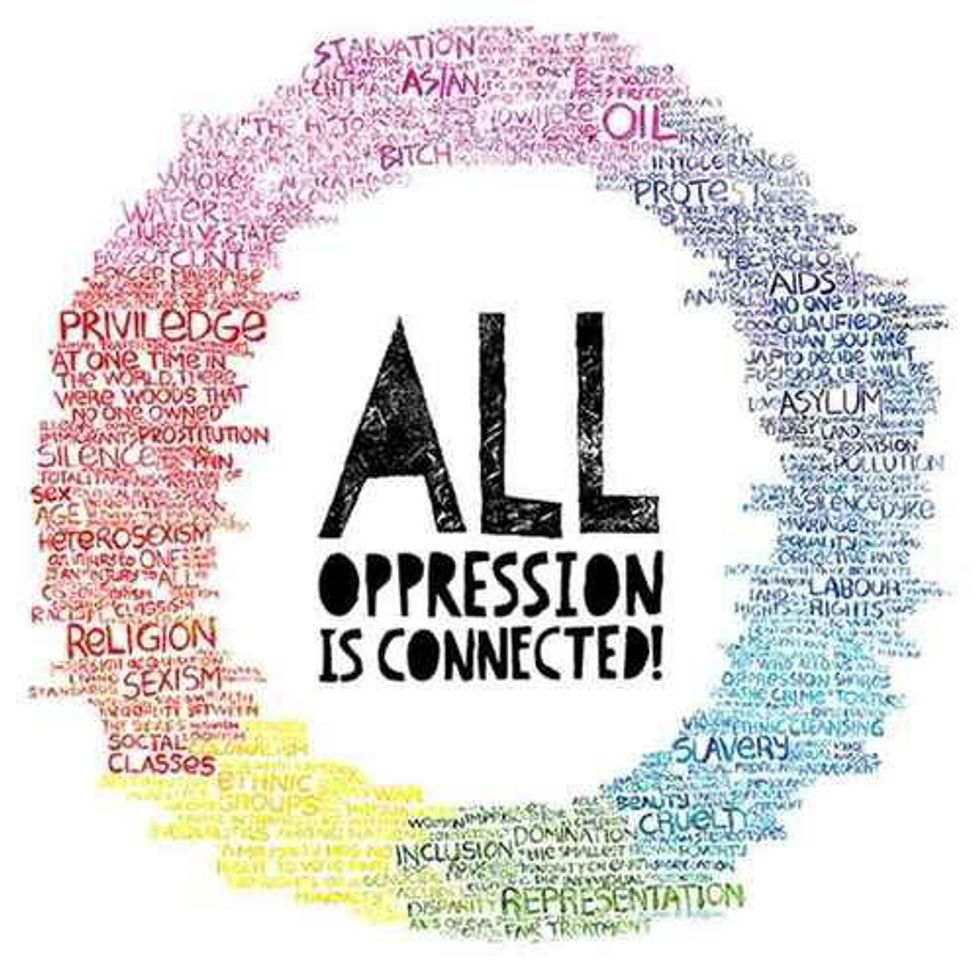*trigger warning for discussion of transphobia*
Feminism is one of those words that has about a million potential definitions. Most of my feminist friends would probably come up with a definition that has something to do with equality, for example “the movement for gender equality” or more intersectionally “equality for everyone, no matter their gender identity, race, sexual orientation, ability, et cetera.” A more radical approach might be “the movement for liberation from all systems of oppression” which can also be read as “burn it down. Burn everything.” All of these are acceptable definitions, as far as I’m concerned.
However there are certain approaches to feminism that may seem not to mesh with yours or my preferred definition, or may not wholly fulfill our expectations of what feminism should be. Here are some examples of approaches to feminism that can range from non-ideal to actively harmful:
Radical feminism (TERFs).
Some may be aware and some may not that something of a schism has occurred within 3rd wave feminism, between self-identified “radical feminists” or “radfems” if you like, and other 3rd wavers, sometimes referred to as “liberal feminists” or “libfems.” Now, “radical feminist” might sound cool-- it does to me, at least-- because it sounds like someone who is politically radical (radical meaning someone who wants to see and create significant change to the current system) and is also a feminist. But unfortunately, that term has been co-opted by a specific type of feminist.
Now there are discrepancies between different factions of radical feminists to be sure, but in general, radfems are feminists who reject a lot of third-wave developments, such as inclusivity of trans people and the view that femininity isn’t inherently bad or oppressive. Radfems see things like makeup, shaving, and dressing “femme” as instruments of oppression and anti-feminist no matter the circumstance, and see things like sex work, porn, and kink as inherently exploitative of women, again, no matter the circumstance. To be fair, those things are complex issues, and many do harm women in certain situations, especially under the current patriarchal social order (though that is different from them being inherently harmful).
However, one element of radical feminism is much less of a gray area, and that is radfems tendency to view gender identity as non-existent. Radfems often refer to trans men and AFAB nonbinary people as “dysphoric females” and try to offer them “alternatives to transition” in ways that are dismissive and invalidating, as well as disregarding the impact of patriarchy on transwomen or other AMAB trans people on the grounds that they are “male” which is also a violent dismissal of these individuals’ gender identities. This is why some radfems are referred to as trans-exclusive radical feminists or “TERF”s. The way that TERFs transphobically deny the legitimacy of non-cis gender identities is not only harmful to any trans individuals they may come into contact with, but much of the specifically transmisogynist rhetoric that paints transwomen as somehow dangerous or agents of oppression, also incites and/or legitimizes violence against transwomen.
White feminism.
As this fantastic article points out, white feminism is essentially “‘one-size-fits-all’ feminism, where middle class white women are the mould that others must fit.” Basically, it’s feminism that only focuses on issues that impact “all women,” which really means excluding issues that affect women of color and/or working class women differently and pushing the narrative that what’s good for rich white women is good for all women. This is probably the result of decades of the feminist movement being exclusively focused on rich, middle-upper class white women, beginning with the women’s suffrage movement starting in the late 19th century when only rich white women had access to the kind of power needed to advocate for women’s rights. Because of the privilege that rich white women have, they have often been at the forefront of much of feminist activism, which has resulted in white women’s issues being centered and voices of women of color being ignored in many feminist spaces.
Consider, as an alternative, the modern concept of intersectionality, which means acknowledging the intersection between gender and other identities like race or sexual orientation. Intersectional feminists recognize that women of color have unique issues that result from the combination of their race and gender, that neither men of color nor white women fully experience, and are aware that consistently putting white women’s issues first does not help women of color. Another term for white feminism could be "non-intersectional feminism" Remember when Taylor Swift accused Nicki Minaj of “pitting women against women” and then Miley Cyrus tried to tell Nicki how to properly approach the subject of race? Classic white feminism on the part of both Taylor and Miley.
“101” feminism.
What I call “101” feminism often intersects with the idea of white feminism. It tends to also lack intersectionality, because in general it lacks a complex view of gender or patriarchy. Think back to when celebrities, mostly female, started declaring themselves to be feminists. Of course, this was quite exciting, since people in the public eye were finally acknowledging the existence of gender inequality, and getting rid of some of the stigma associated with feminism. However, as the years go by, it seems as though many of these celebrities are still stuck on a couple of the simplest, most accessible feminist issues, like the gender pay gap, and maybe representation of women in media. These are important issues, but the way that celebrities like Emma Watson, Amy Poehler, or Lena Dunham, among others, talk about them tends to be oversimplified, as one-dimensional problems with one-dimensional solutions, rather than digging into the complex patriarchal roots of inequality. While it was good enough at one point that they called themselves feminists at all, and it's fine for people who are just starting to learn about feminism, I think it’s time that we raise our standards for these people who have been claiming the title of feminist for quite some time.
So, what do we do about it?
There’s no doubt that these approaches to feminism are insufficient at best and toxically harmful at worst. However, the way I often hear these approaches to feminism dealt with is not ideal. Instead of acknowledging these as being bad approaches to feminism and trying to do something about the negativity, many people’s response is just a dismissive “well, that’s not really feminism” or “that person isn’t a real feminist.”
This response is inadequate because, in short, it means very little. Of course the intention is good-- it’s meant to express disapproval for the person or their behavior, and declare that feminism should stand for something different, but it doesn’t actually address the specifics of what is wrong with the behavior or how to repair the harm that was caused by it.
Most importantly, the phrase “isn’t a real feminist” dismisses the real concerns that people may have with the behavior of certain feminists.For example if a trans person said to me “feminists are always misgendering me and being hostile toward me because of my identity” or “feminists keep saying I shouldn’t transition’” is it really the most sensitive or respectful thing for me to reply by just saying “oh, those aren’t real feminists”? No! It just dismisses their concern without addressing it, and completely disregards the fact that they were significantly harmed by feminists.
Or, if a woman of color says to me “feminists only care about white women’s rights, they don’t listen to women of color when we bring up racism and say we’re being divisive when we do.” If I say “real feminism is intersectional,” once again I’m just dismissing her statement, basically saying it doesn’t matter that white feminists are constantly marginalizing women of color because they “aren’t real feminists” but it does matter, because some of the most powerful feminist leaders are also the most white feminist-esque (see, Gloria Steinem, Madeleine Albright, Hillary Clinton, and numerous celebrities with a lot of cultural influence), and who they decide to ignore has a major impact on many people.
So instead of dismissing concerns with “they’re not a real feminist” what should you say instead?
If you’re dealing with someone who’s been harmed by one of the abovementioned types of feminism, the best thing to do is really just to listen and be understanding. If your feminism doesn’t line up with what that person experienced, then there’s no need to be defensive, since clearly they’re not talking about you. Just be empathetic.
If it seems like the person you’re talking to is open to hearing from you about your beliefs and your concept of feminism, then rather than saying “TERFs aren’t feminists” or “white feminism isn’t real feminism” or anything like that, you can say “I think that type of behavior/belief is bad feminism, and I’m sorry you had that experience.” Instead of saying “real feminism is inclusive” you can say “I think that feminism should be inclusive, which is why I’m an intersectional feminist.” You can explain what your type of feminism means and does, and communities in which that type of feminism can be found.
Most importantly we need to be actively working against the harm that is caused by bad feminism. We need to be centering the needs of women of color and paying attention to how they differ from the needs of white women. We need to be active against transphobic speech and behavior, acknowledge how people of all genders are impacted by patriarchy, especially trans individuals, and make sure that we prioritize the safety of trans people and the legitimacy of trans identities in all of our feminist actions. We need to recognize the issues that exist within our own movement, and rather than dismissing or ignoring them, work to improve them, and ultimately create a better feminism for everyone.
